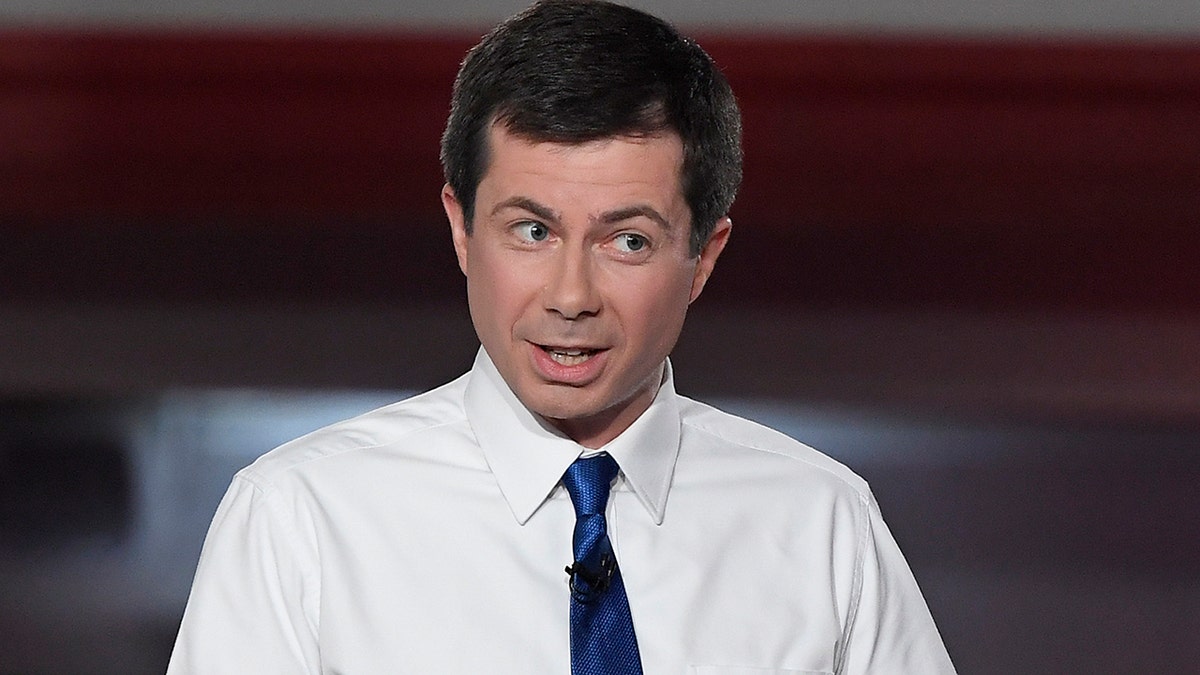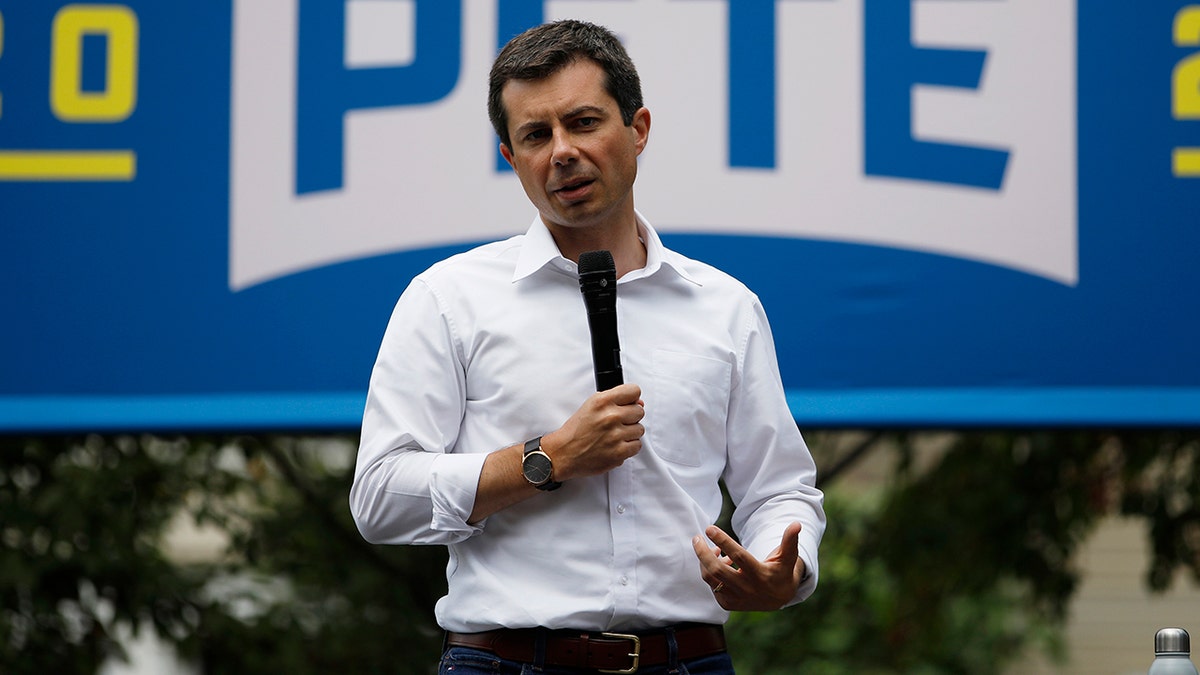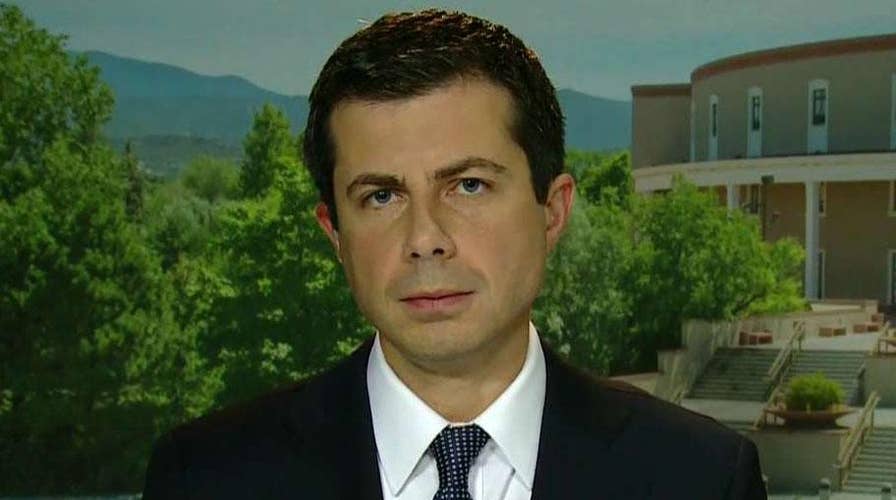Pete Buttigieg on gun violence in America, whether presidential campaign has stalled
Presidential candidate Mayor Pete Buttigieg joins Chris Wallace on 'Fox News Sunday.'
South Bend Mayor Pete Buttigieg is focusing fresh attention on a sweeping mental health plan as the candidate looks to connect with primary voters in New Hampshire, one of the epicenters of the opioid crisis over the past few years.
Over three days, Buttigieg held at least a half dozen events in New Hampshire that attracted at least 3,200 prospective voters, according to a campaign official. Often, the audiences at his town halls and house parties appeared receptive to his speeches on mental health.
PETE BUTTIGIEG: 'SYSTEMIC RACISM IS A WHITE PROBLEM'
His 14-point plan boils down to a few main ideas: Integrating primary care with mental health checkups, removing stigma associated with talking about mental health, enforcing mental health parity among insurers and empower local organizations to implement solutions that work in their communities. In many ways, Buttigieg's plan ties mental health and drug addiction together in a way that recognizes how intertwined they are.
"Pete's vision for the future of mental health and addiction care is rooted in embracing prevention and ensuring that every person ... has the resources and support they need to begin to heal," the policy outline on his website reads. In other words, his goal is to make sure people in New Hampshire and across the country can count on the government to lift them, whether they're dealing with seasonal depression or heroin withdrawals.
New Hampshire was Buttigieg’s chosen launching pad for his mental health platform, and for good reason – the Granite State has an opioid overdose death rate of more than twice the national average, according to the National Institute on Drug Abuse. In 2013, the state had only 30 deaths involving fentanyl; that number rose to 374 in 2017.
"I was really impressed by it; it was comprehensive in the way it thought about really important things about mental health."
“I was really impressed by it; it was comprehensive in the way it thought about really important things about mental health,” said Peter Evers, the president of the New Hampshire Community Behavioral Health Organization. “It was written by someone who really had a finger on the pulse of what’s going on in the nation with behavioral health.”
Evers said he endorses Buttigieg’s mental health plan, though not exclusively, saying that it’s the most comprehensive one on the subject he’s seen so far.
His approach to mental health, especially concerning the destigmatization around talking about it, is a generational approach, Evers said. More now than ever, younger people and millennials, a group that Buttigieg belongs to, are investing in their mental health and preventative care.
Another approach Buttigieg takes that seems simple but has had large ripple effects is the simplification of the National Suicide Awareness Hotline to a three-digit number. In New Hampshire, the number is 211, and Evers said it’s been immensely effective.

Democratic presidential candidate South Bend, Ind., Mayor Pete Buttigieg speaks speaks during a FOX News Channel Town Hall, Sunday, May 19, 2019, in Claremont, N.H. (AP Photo/Jessica Hill)
“That’s all you have to remember if you’re in the depths of despair in the state,” said Evers. “It’s more than doubled the number of people who are reaching out in our area.”
Within his campaign, staffers say Buttigieg’s campaign has also focused on their own mental health. After particularly challenging days on the trail, such as in days following the El Paso and Dayton, Ohio massacres, campaign manager Mike Schmuhl reached out to the staff to offer resources and ensure they felt supported.
Buttigieg’s campaign staffers said they’re not pinning their hopes in New Hampshire’s primary to the mental health policy, but certainly understand the urgency for mental health reform there and across the country.
"From Nashua to the Upper Valley, Peterborough to Ossipee, Pete listened to voters, took their questions and showed that he understands the urgency needed to tackle this crisis," said Kevin Donohoe, the campaign's New Hampshire communications director. "New Hampshire voters are getting behind Pete Buttigieg because he has the courage to break with the past to offer fresh and new solutions to the challenges facing our country."
Buttigieg is polling at just around 7 percent in New Hampshire, according to the RealClearPolitics average for the state.
But Buttigieg's campaign said that Labor Day marked a turning point for the mayor, who has plateaued in national polls in recent months. They unveiled plans to bolster field operations in New Hampshire and Iowa. In New Hampshire, the campaign plans to open 12 new field offices and hire more than a dozen paid staff. The new offices would place a Mayor Pete operation in every county in the state, and the new hires would bring the number of paid staff to 56, according to WMUR.
Recently, the mayor received a couple of notable endorsements from high profile politicos in the Granite State. Twelve-term state Rep. Susan Almy endorsed Buttigieg, a decision she said she made at a recent town hall in Cornish, New Hampshire.
"During Pete's town hall in Cornish, I saw a leader who brought out the best in the over 500 people present, dealt well every issue thrown at him, and won our hearts and minds," Almy said.

Democratic presidential candidate South Bend Mayor Pete Buttigieg speaks at a campaign event, Wednesday, Aug. 14, 2019, in Muscatine, Iowa. (AP Photo/John Locher)
Earlier, in July, Buttigieg received the endorsement of another New Hampshire politician, state Rep. Matthew Wilhelm. The first-term lawmaker represents Manchester, one of the largest cities in the state, and was swayed early on by Buttigieg's plan to expand paid national service opportunities.
“That’s what happened. We had folks riding those shuttle buses from the high school, who probably hadn’t been on a yellow bus since they were a kid,” said Eleanor Cochrane, who hosted a house party for the mayor in Hancock, New Hampshire. “We had a tremendous cross-section [of voters], and the most enthusiastic feeling at that house party meet up.”
Cochrane, a retired registered nurse who also chairs the Hancock Town Democratic Committee, said mental health is increasingly a priority among voters, and that it’s time lawmakers stepped up.
“All of the issues of mental health care have to be destigmatized, because the numbers are huge, and the resources, at least in this state, are pitiful,” she said. “I’m glad people are talking about it. I’m glad candidates are talking about it, and I’m glad candidates have what seem like reasonable, manageable plans to adjust it.”
As for the reception among the roughly 300 attendees of her house party, she said: “What we heard was very positive. There were a lot of people who said, “Man, I am so glad I got to hear him.’”
Indeed, a solutions-based approach may resonate with Granite Staters as their February, 2020 primary approach.
“Solutions are what New Hampshire voters of all political parties want,” said Holly Schulman, the New Hampshire Democratic Party communications director. “They’re sick and tired of Republicans’ insults, obstruction, and backwards priorities.”
BUTTIGIEG RELEASES PLAN TO BATTLE DOMESTIC TERRORISM IN WAKE OF SHOOTING MASSACRES
Mental health is poised to be a defining issue in the state's primary, though it will probably be one of many that voters consider when they head to the ballot box.
"I don't think it's going to be the defining issue, but I think it'll be one of the issues that's going to collectively be the final push for people," said Carlos Cardona, the Laconia Democratic Party chairman.













































